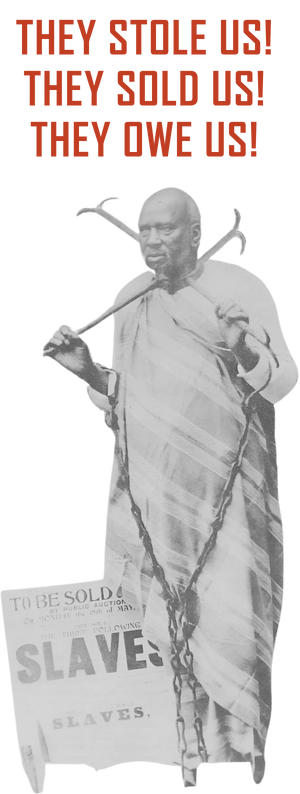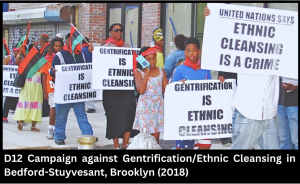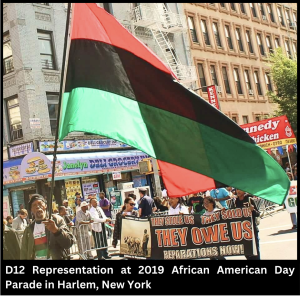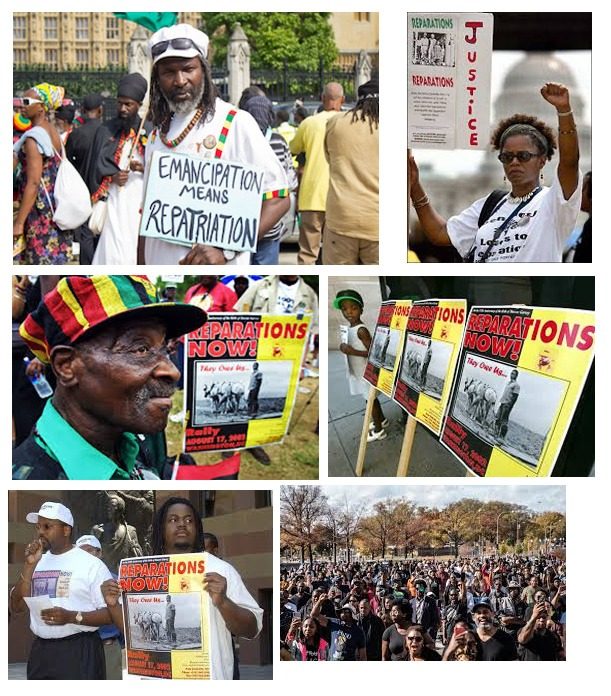Reparations Now!
D12’s Position From Decades in the Struggle for Reparations
- In the final analysis, the debt owed to People of African Descent is the responsibility of the U.S. government

- The debt owed to People of African Descent includes victims of chattel slavery and those who arrived in the U.S. after the period of chattel slavery, who have suffered the continuing oppression of Jim Crow, White Supremacy and the hydra-headed terror of racialized capitalism
- The debt owed is a collective, rather than an individual one
- Reparations will only be won through an irresistible pressure brought by the organized masses of People of African Descent.
- Our platform is built on the foundation set by those People of African Descent – Callie House, W.E.B. DuBois, Queen Mother Moore, Malcolm X, and more – whose work preceded our organization’s birth in 1987. But it also reflects the lessons we have learned from our own participation in this fight:
Since 1989, for over three decades, the December 12th Movement (D12) has been actively engaged in the fight for reparations for descendants of enslaved Africans in the United States and worldwide, addressing the ongoing violations of our human rights. D12’s decades of work in the struggle for reparations directly led to the United Nations’Durban Declaration and Programme of Action (DDPA) which for the first time in history declared the Trans-Atlantic Slave Trade and Slavery as a crime against humanity. We cannot underestimate the significance of the DDPA. Crimes against humanity have no statute of limitations. Therefore, our demand for reparations can be brought under international law.
Our work is inspired by Malcolm X, who viewed the struggle of African Americans in the United States as part of a larger global fight for human dignity—one that must be addressed on an international level. Following Malcolm’s lead, our reparations work links the enslavement of African peoples to the colonization of the African continent. As a result of slavery and colonialism, African peoples have been dispersed and divided by national boundaries. Nevertheless, our struggle remains fundamentally Pan-African, with the fight for reparations uniting African people in a revolutionary battle against the West and its exploitative foundations.
8-Point Platform
1. Full Recognition of Our Human Rights
We demand that the United States acknowledge and implement the Durban Declaration and Programme of Action.
2. Healthcare
We demand a $50 billion reparations down payment to establish state-of-the-art healthcare facilities, owned and controlled by the Black communities in which they operate.
3. Police Brutality & Mass Incarceration
We demand the elimination of the servitude exception in the 13th Amendment and the establishment of a federally-funded national evaluation board*, that has direct oversight, subpoena, and decision making power on all matters related to the criminalization and victimization of Black people, including the implementation of a national standard for redress of damages/loss of life resulting from the criminal injustice system (i.e. wrongful conviction, death, and police terrorism, etc.).
*composed of local community members with demonstrated lived experience and expertise
4. Ethnic Cleansing & Displacement
We demand an immediate injunction on all forms of displacement of Black people from their historic communities through various forms of urban renewal, gentrification, and property seizures until a fully staffed commission can review and remunerate damages from all forms of displacement—private and public—that resulted in Black disenfranchisement from property and forced movement and relocation. A total sum to be allocated to restore historic property theft and to rebuild anew.
5. Education
We demand the creation of a federal fund to support all predominantly Black educational institutions, prioritizing those where segregation has been highest and resources most lacking. This fund must build, renovate and maintain state-of-the-art learning facilities: ensure a livable wage for teachers, foster expertise in culturally-relevant pedagogy and curricula, and hire/train specialists to connect families, schools, and vital institutions in these communities.
6. Cultural Institutions
We demand federal funds for the Association of African American Museums to preserve, reclaim, and rectify all aspects of African-derived History—from our forced displacement into the Americas to our contemporary struggle for human rights. All historic artifacts essential to telling our story must be placed and curated within the network of Black museums, libraries, and colleges and/or returned to the people descended from those original sites.
7. Nationhood & Self-Determination
We demand that the United States recognize that Black people have the right to self-determination. Our unique oppression—rooted in enslavement and systemic racism—necessitates independent political and economic development without interference from the U.S. state apparatus. A federally supported general reparations fund must be established for a plebiscite, and an annual evaluation by a special rapporteur and the Working Group of Experts on People of African Descent to evaluate the progress of development of our communities as a NATION.
8. Pan African Development
The United States must recognize that the 50 million Black people in the U.S. are part of the African Union’s (AU) 6th region. Finally, we demand the U.S. government and military cease intervention and aggression in all its forms within the African continent and across the African Diaspora.
D12’s leadership in the reparations movement also includes:
- 1993 D12 makes the call in Geneva, Switzerland for a world conference against racism
- 1997 United Nation agrees to hold The World Conference Against Racism (WCAR) and D12, along with the National Black United Front (NBUF) begins organizing the Durban 400, which leads to the DDPA.
- 2002 D12 co-organizes the first national Reparations Rally in Washington DC and followup rallies in New York City (2003), Columbia, SC (2004) and Memphis, TN (2004)
- 2002-2007 D12 provided lead counsel for class action lawsuit against 17 corporations that directly profited from slavery.
- 2009 Presented at the follow-up to the WCAR in Geneva, Switzerland.
- 2013 D12 participated in the establishment of CARICOM’s reparations commission
- 2015-2024 Organized events under the United Nations International Decade for People of African Descent.
- 2020 D12 Demands that President Joe Biden issue an Executive Order for a 50 Billion Dollar Down Payment for reparations to bypass legislative roadblocks.
2001 United Nations World Conference Against Racism: DURBAN 400
D12 organized 400 delegates to ensure that three critical points were included in the Durban Declaration and Programme of Action (DDPA):
- Slavery was a crime against humanity.
- The roots of the transatlantic slave trade were economic.
- Reparations are owed to descendants of enslaved Africans.
D12 played a pivotal role in this significant Pan-African event, which established reparations as a global issue. The Durban conference marked a historic defeat for the United States and other Western nations, while providing a framework for the continued fight for reparations.
National Reparations Rally & Class Action Lawsuit

Following the Durban Conference, in 2002, D12 and the National Black United Front (NBUF) organized the first national reparations rally in Washington, D.C., bringing the demand for reparations to the forefront and highlighting the United States’ ongoing denial of its centuries-old debt.
In the same year, D12 provided legal counsel and organizational support for a class action lawsuit against 17 corporations—including Aetna, JP Morgan, and Fleet CSX—that directly profited from the trade, exploitation, and free labor of Africans in the United States. This legal action underscored the United States’ denial of its history and the slave trade as the foundation of its economic development, reinforcing our demand for reparations and addressing the collective economic conditions of Black communities.
CARICOM Reparations Commission
Despite the United States’ withdrawal from the 2009 Durban Review Conference, D12 continued to advocate for the Durban Declaration and Programme of Action. Demonstrating further Pan-African unity, D12 collaborated with The Caribbean Community (CARICOM), an intergovernmental organization, to help establish their Reparations Commission in 2013 and its 10-point plan.
Executive Order for Reparations
In 2020, after Joe Biden credited Black voters with securing his election victory, he pledged to support the Black community. D12 immediately tested this promise by calling for an executive order to allocate a $50 billion down payment for reparations. This strategy remains the most viable national approach, as legislative efforts have consistently failed to move beyond rhetoric. We stand firm on the need for an executive order that cannot be diluted by endless commissions or studies. An executive order for health care breaks the ice and begins a process of repair that establishes a collective approach that addresses the most vital needs of our community.